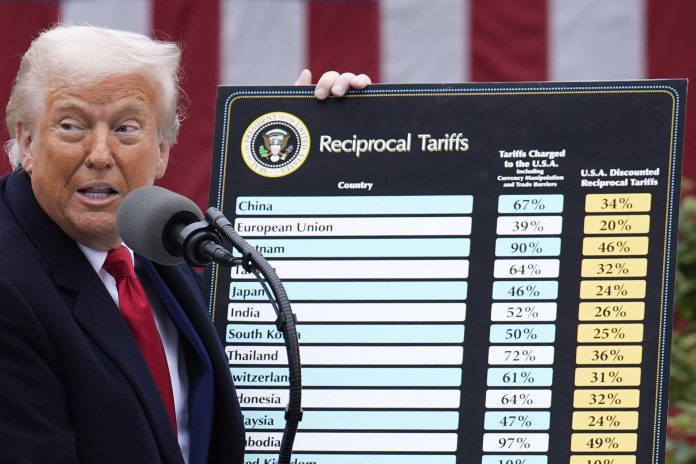- A conservative legal group has filed the first major lawsuit against President Trump’s tariffs, alleging misuse of emergency powers.
- The lawsuit argues the tariffs are unconstitutional because tariff authority belongs solely to Congress, not the President.
- The stock market has dropped over 10% in the past two days due to the massive economic uncertainty.
A conservative legal group, the New Civil Liberties Alliance (NCLA), has filed the first significant legal challenge to President Donald Trump’s latest tariffs, alleging that these tariffs violate constitutional limitations by improperly using emergency executive powers.
As American investors grapple with investment portfolios falling by almost 10% this past week, understanding the implications of this lawsuit, along with what is happening with the tariffs, is important.
The legal action filed in the Northern District of Florida raises crucial questions about presidential authority, the separation of powers, and the financial consequences for average Americans. T
his lawsuit could have significant impacts on U.S. economic policy, market stability, and investor confidence, making it relevant not only to policy experts but also to everyday American families and their financial futures.
Why The Lawsuit Claims Trump’s Tariffs are Illegal
The central claim of NCLA’s lawsuit is that President Trump overstepped the legal boundaries defined by Congress and the U.S. Constitution. According to the 29-page complaint, tariffs are fundamentally taxes on American consumers and businesses engaging in international trade. The authority to impose such tariffs, the complaint argues, rests exclusively with Congress, as stipulated by Article I, Section 8 of the Constitution.
In its legal challenge, the NCLA specifically targets Trump’s use of the International Emergency Economic Powers Act (IEEPA) of 1977. Historically, presidents have used IEEPA for sanctions against foreign governments, terrorists, or in response to genuine national emergencies. However, no prior president has used IEEPA to impose broad tariffs, such as the ones we saw implemented this week. The lawsuit underscores this unprecedented action as evidence of presidential overreach, stating explicitly that the IEEPA does not authorize tariffs.
NCLA Senior Litigation Counsel Andrew Morris emphasized in a statement that Congress never intended this:
“By invoking emergency power to impose an across-the-board tariff on imports from China that the statute does not authorize, President Trump has misused that power, usurped Congress’s right to control tariffs, and upset the Constitution’s separation of powers.”
The complaint further highlights inconsistencies in Trump’s stated rationale for imposing the tariffs. While officially declared to address an emergency linked to illegal opioids entering the U.S., Trump’s public comments reveal motives rooted in reducing trade deficits and increasing government revenue, goals unrelated to the declared emergency.
Related: Are International Stocks Now Safer Than U.S. Stocks?
Implications For Investors And The Economy
Since Trump’s latest tariffs took effect, investors have experienced a significant financial downturn, with the S&P 500 losing more than 9% of its value this week alone.

The NCLA lawsuit directly addresses these economic impacts, illustrating how tariffs increase operational costs for U.S. businesses reliant on imported Chinese goods. Companies like Simplified, a Florida-based small business named in the lawsuit, are facing severe competitive disadvantages due to heightened tariffs, leading to lost profits, higher consumer prices, and potential job losses.
If successful, the lawsuit could provide relief to businesses and investors by nullifying the latest tariff hikes.
Conversely, a ruling supporting the administration could solidify presidential authority to implement tariffs, potentially leading to greater market volatility and further investment declines.
Investors should carefully monitor the lawsuit’s developments and adjust their financial strategies accordingly, as the court’s decision could significantly influence market stability.
What’s Next For The Lawsuit And Its Potential Outcome
The lawsuit seeks immediate action to declare Trump’s tariffs unconstitutional, halt their enforcement, and reverse tariff increases already implemented under Trump’s executive orders. The litigation process, however, will likely be complex and lengthy, likely being appealed up to the Supreme Court.
A ruling against Trump would reaffirm Congressional authority over tariffs, potentially stabilizing markets and easing investor concerns. Conversely, a decision upholding presidential discretion under emergency declarations could set a precedent expanding executive power over economic policy, potentially increasing future uncertainty for businesses and markets alike.
Don’t Miss These Other Stories:
8 Last-Minute Tax Reminders For 2025
Warren Buffett Plans To Donate 99.5% Of His Fortune
10 Best Short-Term Investments And Strategies
Create your very own Auto Publish News/Blog Site and Earn Passive Income in Just 4 Easy Steps







